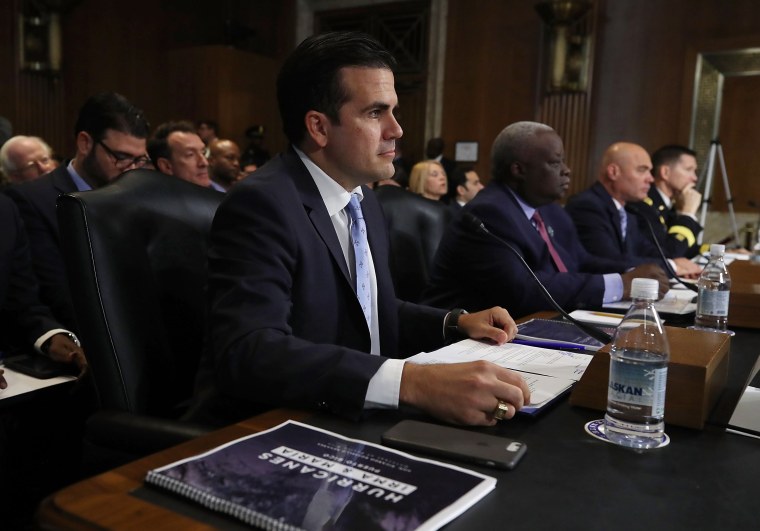WASHINGTON — Puerto Rico's governor, Ricardo Rosselló, spent a second day on Tuesday pushing for legislators to increase funding for hurricane relief aid — the island is asking for nearly $95 billion — but what lawmakers largely focused on was the now-canceled contract the island signed with a small Montana firm to help rebuild the island’s electric grid.
Rosselló tried to distance himself from the $300 million pact with the firm, Whitefish Energy Holdings, telling the House Natural Resources Committee and the Senate Energy and Natural Resources Committee that he had “no participation in this contract, zero,” adding, “We are completely committed to transparency in this process.”
But before the hearing, documents sent to the committee by the Puerto Rico Electric Power Agency (PREPA) show that the utility company ignored advice from its own lawyers to include certain contractual protections, such as the ability to terminate the deal within 10 days for any company breach; that the company be required to hold a performance bond; or that there be predetermined rates for time and materials.
The documents further show that the island government is still paying Whitefish for ongoing work and that the company is making a nearly 50 percent profit. The committee chairman, Rob Bishop, R-Utah, criticized the contract process and expressed skepticism that the island government is prepared to take on the task of hurricane recovery without significant federal oversight.
“A legacy of dysfunction (at PREPA) has created a competence deficit that threatens the Island’s ability to improve conditions for its citizens," Bishop said in a statement. "Confidence in the utility’s ability to manage contracts and time-sensitive disaster related infrastructure work is long gone.”
Bishop stated that despite near "universal criticism" of the contract, the executive director continued to defend it for weeks until the governor ordered its cancellation.
"This lack of institutional control within Puerto Rico’s largest municipal debtor raises grave concerns about PREPA’s, and by association, the government of Puerto Rico’s ability to competently negotiate, manage and implement infrastructure projects without significant independent oversight," Bishop stated, adding that the island's "controversial decisions" may have made the crisis worse.
Bishop told Rosselló in Tuesday’s hearing that the island needs to close a “credibility gap” if it expects to see anywhere near the $95 billion it is asking for — “and I do believe you need the money.”
This was the second hearing in as many weeks where the committee focused on post-hurricane Puerto Rico, and while PREPA executive director Ricardo Ramos excused himself from testifying before the House committee last week, he appeared on Tuesday before the Senate Energy and Natural Resources Committee and he defended his initial decision to approve the Whitefish contract.
“After reviewing about a half-dozen proposals from potential first responders, we found that only two offered the immediate services that PREPA needed. One proposal required a guaranteed payment of $25 million, the other — from Whitefish — offered PREPA the ability to pay only for work that was completed (and mobilization/demobilization),” Ramos told the committee.
“I therefore authorized our contracting staff to execute a contract with Whitefish while we continued to seek additional assistance from others for the complete, multibillion dollar restoration effort still to come. In retrospect, there are some steps in our contracting process with Whitefish that we could have done better. I chose to contract with Whitefish because my priority was securing the immediate assistance that we needed to begin restoring power as quickly as possible to our most critical customers.”
Several lawmakers, however, appeared perplexed that the island did not immediately seek to enter in a mutual aid agreement with stateside utility companies that would repair and restore power at cost instead of agreeing to the much higher costs incurred in the Whitefish contract, including Whitefish paying linemen more than $60 an hour but charging the island government more than $300 an hour.
“Everybody in the world was calling offering to help. This is a great injustice to the U.S. taxpayers that Puerto Rico went with a company that chose to gouge the U.S. taxpayers,” said Sen. Maria Cantwell, D-Wash. "I think if you would have asked the federal government should we pay these rates, I guarantee they would have said no.”
In addition to Congress, the Government Accountability Office and the FBI are investigating details of the contract.


